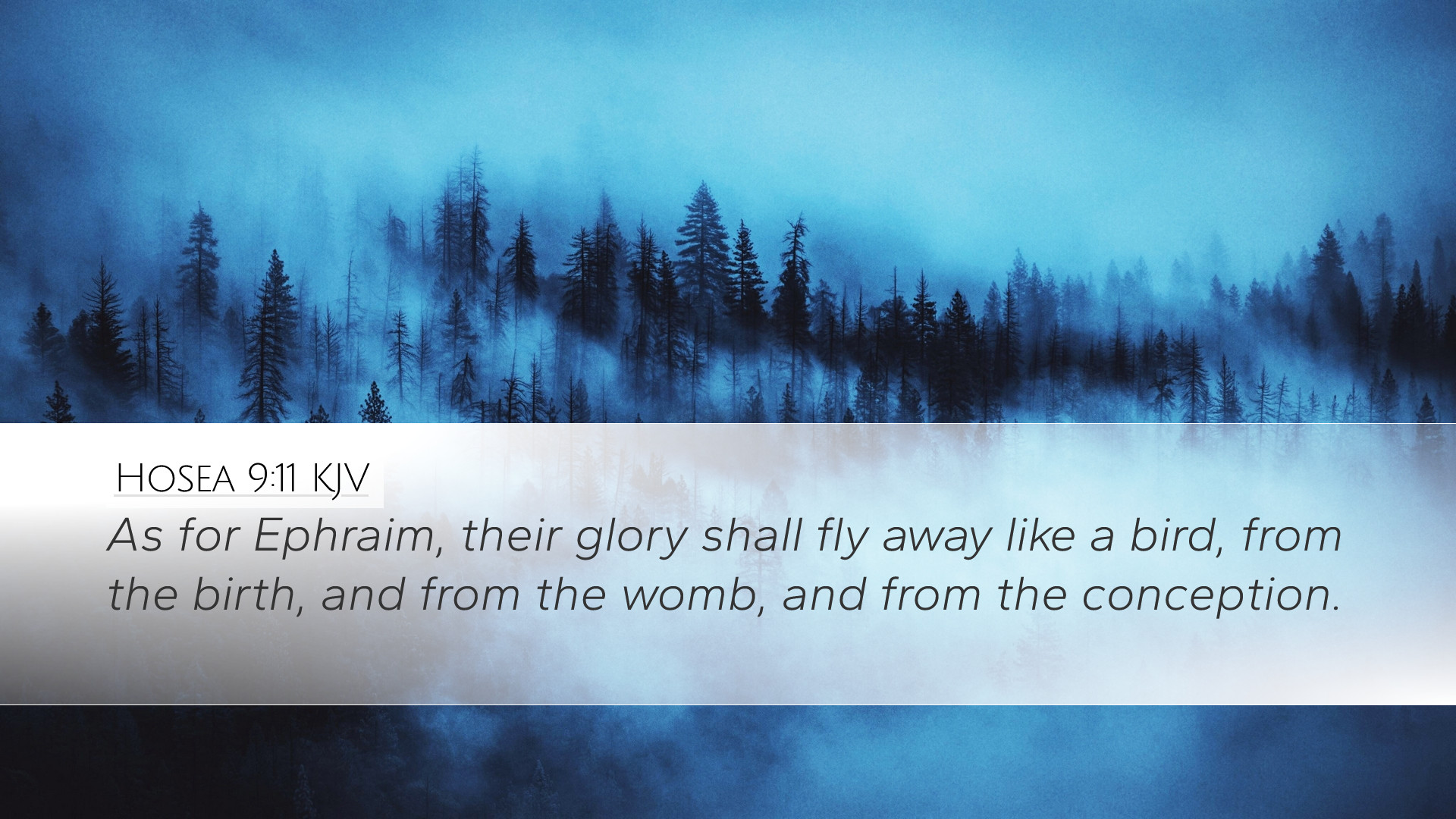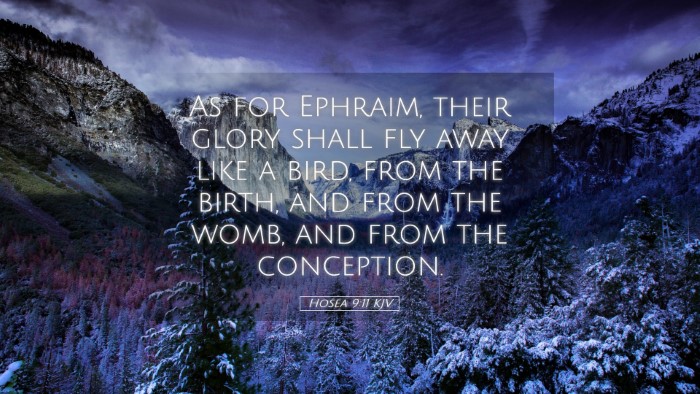Old Testament
Genesis Exodus Leviticus Numbers Deuteronomy Joshua Judges Ruth 1 Samuel 2 Samuel 1 Kings 2 Kings 1 Chronicles 2 Chronicles Ezra Nehemiah Esther Job Psalms Proverbs Ecclesiastes Song of Solomon Isaiah Jeremiah Lamentations Ezekiel Daniel Hosea Joel Amos Obadiah Jonah Micah Nahum Habakkuk Zephaniah Haggai Zechariah MalachiHosea 9:11
Hosea 9:11 KJV
As for Ephraim, their glory shall fly away like a bird, from the birth, and from the womb, and from the conception.
Hosea 9:11 Bible Commentary
Hosea 9:11 - Commentary Summary
The verse Hosea 9:11 states: "As for Ephraim, their glory shall fly away like a bird, from the birth, and from the womb, and from the conception." This verse encapsulates a prophetic declaration concerning the fate of Israel, particularly the northern kingdom of Ephraim. The prophetic insights from esteemed commentators such as Matthew Henry, Albert Barnes, and Adam Clarke provide a comprehensive understanding of this pivotal text.
Contextual Background
Hosea prophesied during a tumultuous time in Israel's history, marked by moral decay, idolatry, and political instability. The audience for this prophecy includes the people of Israel, with Ephraim representing both a tribal identity and the collective identity of the northern kingdom. Hosea's warnings of impending judgment serve as a call to repentance.
Commentary Insights
1. Matthew Henry's Commentary
Matthew Henry emphasizes the metaphorical imagery of a bird flying away, signifying the fleeting nature of glory. He argues that the "glory" of Ephraim refers to both its military strength and its spiritual influence that would soon dissipate due to divine judgment. Henry draws attention to the stages mentioned—from birth, from the womb, and from conception—interpreting these as symbolic of the complete obliteration of life's early stages of promise and potential. He posits that the sins of the people would directly lead to their downfall, making them unable to witness the flourishing that God intended for them.
2. Albert Barnes' Commentary
Albert Barnes provides a detailed perspective on the implications of this verse, explaining the significance of the metaphor of a bird. He notes that birds are often associated with freedom and life, yet in this context, their flight represents an escape that leads to loss. Barnes elaborates that the glory of Ephraim is not just their physical prosperity but also their covenant relationship with Yahweh, which would come to an end as a consequence of their persistent unfaithfulness. He stresses the inevitability of judgment and urges readers to recognize the seriousness of abandoning God's commands.
3. Adam Clarke's Commentary
Adam Clarke adds depth by exploring the historical context of Ephraim's glory. He contextualizes the verse within the broader narrative of Israel's rejection of God, leading to the priory of judgment. Clarke underscores the tragedy of a nation that was once favored by God, now facing imminent doom due to its willful disobedience. He speaks of the metaphor of flying away as a poignant reminder of what is lost—family, identity, and hope. Clarke’s nuanced interpretation warns against complacency in spiritual life, emphasizing that God's grace can be withdrawn.
Theological Implications
The rich commentaries converge on several key theological principles seen in Hosea 9:11:
- Judgment and Mercy: The themes of divine judgment intertwined with the hope of restoration are essential to understanding the character of God as portrayed in the Old Testament.
- Human Agency and Responsibility: The responsibility of Ephraim in choosing to turn away from God is a critical point, highlighting the importance of individual and collective accountability in upholding faith.
- The Loss of Identity: The symbolism of glory vanishing serves as a stark warning about the consequences of abandoning one's covenant identity in God, prompting believers to reflect on their identity in Christ today.
Application for Today
For pastors, students, and theologians, Hosea 9:11 provides a compelling narrative that translates into contemporary implications:
- Warning Against Complacency: Just as Ephraim faced judgment, believers today are called to examine their spiritual health and commitment to God's ways to avoid a similar fate.
- Restoration through Repentance: There remains an opportunity for redemption, as God’s mercy surpasses judgment for those who turn back to Him.
- Understanding Glory: The pursuit of glory must align with God's will, ensuring that one's life reflects His character and purposes, as revealed through Scripture.
Conclusion
Hosea 9:11 serves as a profound reminder of the transient nature of glory that is not rooted in faithfulness to God. The insights gained from Matthew Henry, Albert Barnes, and Adam Clarke challenge believers to reflect on their lives, urging a response rooted in faith and obedience. May this verse inspire a deeper commitment to living in accordance with God's will, recognizing the weight of each decision in our walk of faith.


